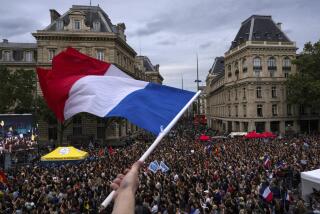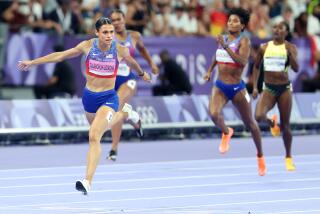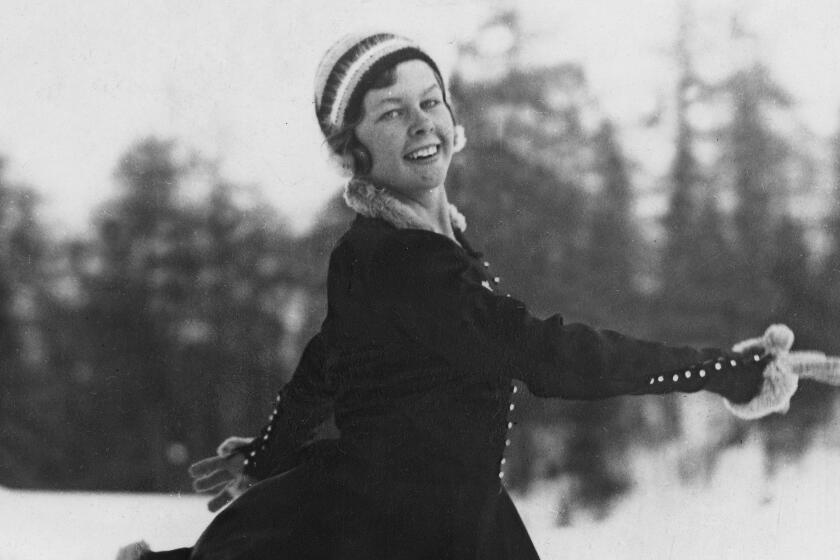Head of Ethics Panel Sends Mixed Signals on IOC Reform
Keba Mbaye of Senegal is often referred to as the sage of the International Olympic Committee. The sage said Friday that the IOC is not fighting “a culture of corruption.”
Not at all, Mbaye said, calling that phrase neither “fair nor right.”
The IOC has spent the last year fending off allegations of excess in connection with, among others, Salt Lake City’s winning bid for the 2002 Winter Games and Atlanta’s successful 1996 Summer Games bid. Six members have been expelled. Four more resigned.
Now, the entire IOC membership is gathering here this weekend to vote on a package of 50 reforms sparked by revelations that Salt Lake bidders spent more than $1 million in cash, gifts, scholarships and other inducements.
Mbaye, however, offered this take at a press conference at the IOC’s headquarters on the shores of Lake Geneva: “If there existed but one honest man in an organization, I think that would suffice not to accuse the organization as a whole.”
His remarks underscore just how tough a sell it may be this weekend to get the reforms through--and, ultimately, whether any reforms will amount to more than incidental change.
Over the last few months, the IOC has appointed an ethics commission, opened the meetings of its general assembly to the press and released financial statements.
The package of 50 reforms, drafted by an 82-member commission that included former U.S. Secretary of State Henry Kissinger, proposes yet more changes. Among them: the addition of 15 athletes to the IOC, as well as age and term limits for delegates.
Member visits to bid cities--the issue at the root of events in Salt Lake--would either be barred or restricted.
IOC President Juan Antonio Samaranch is pushing the reforms hard. He is due to testify Wednesday before a Congressional committee, and needs proof for skeptical lawmakers that the IOC really has changed.
If not convinced, lawmakers have said they may take a hard look at tax rules allowing deductions for the IOC’s corporate sponsors, nine of 11 of which are American.
But if Mbaye doesn’t get it, should Congress--or anyone--believe real change is in the works?
Mbaye, 75, is an esteemed jurist. He has served on the World Court in The Hague. He chairs the IOC ethics commission. He is also an IOC vice president and has been an IOC member since 1973.
Given his background, it might be reasonable to expect that he would be keenly sensitive to the realities of the last year--and, perhaps just as important, to the image issue, for on Capitol Hill perception can be just as important as reality.
And on Capitol Hill, the usual starting point for discussion of Olympic matters is the report on the Salt Lake scandal issued in March by a special commission headed by former Sen. George Mitchell (D-Maine). That report decries the IOC’s long and easy tolerance of a “culture of improper gift giving.”
But, along with telling reporters that “a majority of IOC members have cleaner records than you,” he also offered his belief that rules forbidding IOC delegates from accepting gifts of more than nominal value ought not to apply to Samaranch. Though he was speaking at a press conference showcasing the ethics panel, he stressed that in speaking about the gift rules he was offering his personal opinion.
The purpose of the gift rules is to ensure that IOC votes for bidding cities can’t be bought. Since Samaranch doesn’t vote when the IOC selects the city where the Games go, the rules ought not to apply, Mbaye said.
Typically, Samaranch accepts gifts as a matter of protocol; the presents are turned over to the Olympic Museum in Lausanne for display or storage.
Samaranch was not available Friday for comment. But Franklin Servan-Schreiber, the IOC’s spokesman, was so concerned after the ethics panel’s press conference that he gathered a dozen reporters together late Friday night to clear up what he called “some misunderstandings.”
Servan-Schreiber, acutely aware of the image issue, said, “There is a breach of trust. But if you look at the evidence of the actions of the IOC over the last year, I don’t think it could be questioned there is a willingness on the part of this body to confront difficulty.”
The full session is set for today and Sunday.
More to Read
Go beyond the scoreboard
Get the latest on L.A.'s teams in the daily Sports Report newsletter.
You may occasionally receive promotional content from the Los Angeles Times.





